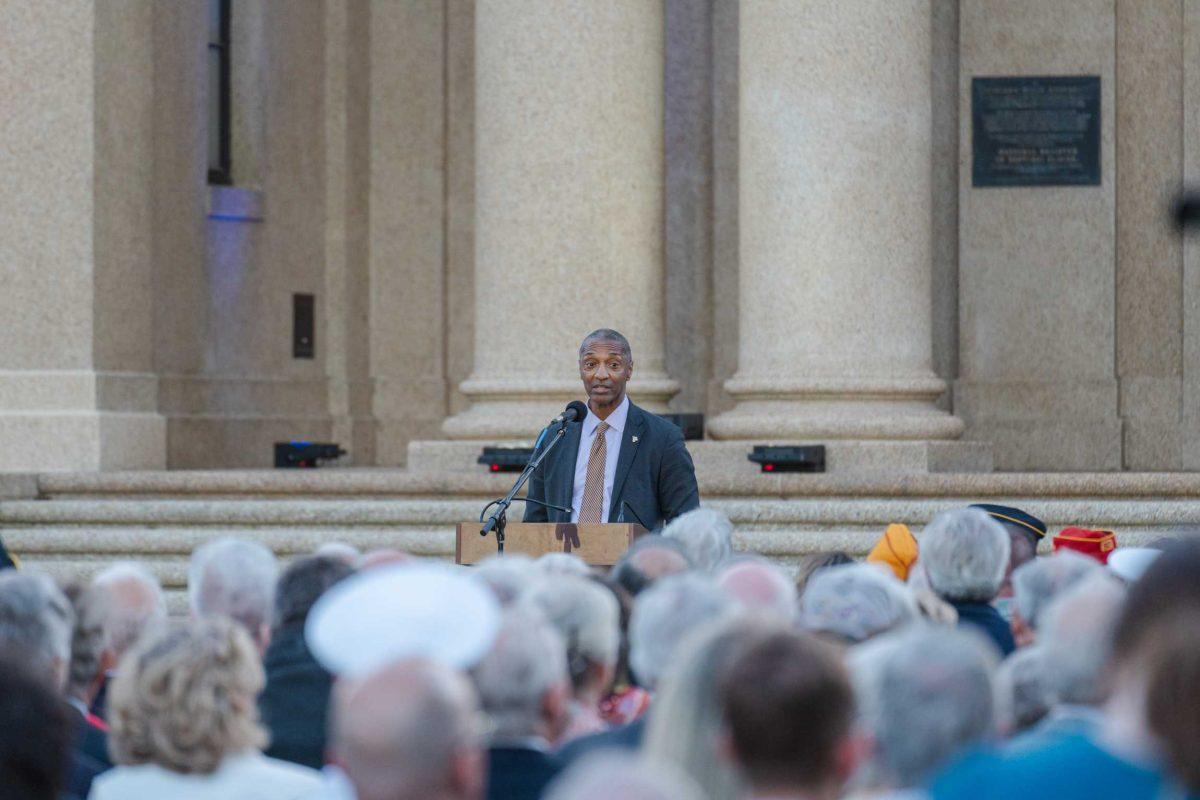Last month, LSU President William F. Tate IV hit the airwaves on the New Orleans radio show Neutral Ground to discuss with its host, Kaare Johnson, whether or not LSU was capable of competing nationally with other comparable institutions of higher education.
The interview was heated, at least initially. Johnson criticized LSU for paying more attention to its athletics than academics, to which Tate took exception, citing the various programs in which LSU is among the top in the country: construction management, internal audit and cybersecurity, landscape architecture, communications disorders, and finance, just to name a few.
The two went back and forth, citing various national ranking systems and ways which LSU was competitive or lacking. By the end of the conversation, Johnson and Tate were able to agree on at least a few things: LSU had strong faculty and some robust scholarly programs, although, in Tate’s words, “we should be better;” LSU folks should acknowledge “that there are some significant quality factors associated with LSU,” such as various areas of STEM and business research institutes and that “those quality factors provide us a platform to be even better.”
Tate’s sentiment, in other words, was that people shouldn’t always be focusing on the negative things at LSU. Good things are going on, too – it’s just a matter of highlighting them.
And fair enough. Even outside LSU’s most obvious wins – the literal ones from the Athletics Department – the school has a lot going for it. Every year, its freshman class gets bigger. Every few months, it seems, the university announces some sort of major grant or donation. LSU contributes significantly to the state’s economy. And it does have stellar faculty from all disciplines.
Tate’s call for a moratorium on critiques lacks an understanding of the motivations for them in the first place.
I, for one, criticize this school, which has given me four years of invaluable education, because I know that what it has given me can also be offered to others, if we only get to the heart of some of its flaws, which is never a comfortable thing to do.
Similarly uncomfortable is the very basic fact that there is more to LSU than its business, engineering and science departments. It’s also the humanities, which have virtually gone unnoticed in Tate’s administration, as well as the professional lives of its employees and the social life of its undergraduates.
Some of us are still waiting and care deeply, for example, for updates on the investigations surrounding the alleged Title IX violations by former LSU football coaches Ed Orgeron and Les Miles (the latter of which, it seems, might be a criminal case).
Though it’s ultimately up to the State Legislature to allocate funds to address many issues, such as the enormous amount of deferred maintenance across campus; some of us are wondering if Tate plans to address these issues at all. Surely, they fall under his purview, even if they don’t directly touch the day-to-day existence of future engineers in Patrick F. Taylor Hall.
What about the shady multi-million-dollar deal LSU signed with Caesar’s Sportsbook? How will that affect underage students? Again, we’re not sure; Tate’s been silent on this issue.
Or, what about the status of that new library we’re supposed to get? Not much has been released about it.
The list could go on. The point is not to make President Tate into a bad guy; he’s not. It isn’t to say that he’s doing a terrible job; I don’t think he is. In fact, it seems that LSU does, actually, have a lot going for it, which we should celebrate loudly.
Rather, it’s to say that the impetus for criticism, whether directed at LSU or Tate himself, isn’t to hand-wring over the future or to debase our reasonable minds in negativity and confirmation bias.
But it is to say that critics of LSU and Tate are more than likely motivated out of a sense of duty and love to a great institution, and out of an understanding that LSU is more than its classrooms – not the sum a particular set of educational outcomes, but instead the makeup of a plethora of personal, academic, social and even romantic experiences that often comprise some of the most memorable years of a person’s life.
Benjamin Haines is 24-year-old history graduate student from Shreveport.








